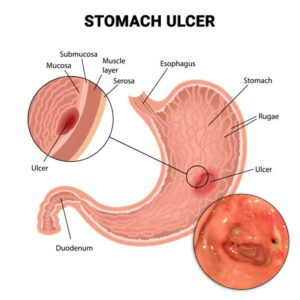
Stomach ulcers—also called gastric ulcers—are painful sores that develop in the lining of your stomach or small intestine. They are a type of peptic ulcer disease and can affect anyone. These ulcers form when stomach acid damages the protective lining, often due to factors like infection, certain medications, or lifestyle habits. Recognizing early signs and seeking help can prevent serious complications.
This guide explores the common symptoms of stomach ulcers, when to consult a doctor, and helpful tips for managing and preventing ulcers.
What Causes Stomach Ulcers?
- H. pylori infection – A common bacterial infection that weakens the stomach lining.
- Long-term use of NSAIDs – Medications like ibuprofen or aspirin can irritate the stomach lining.
- Excess stomach acid – Often linked to stress, spicy foods, or smoking.
- Excessive alcohol use – Irritates and damages the stomach lining.
- Certain medical conditions – Such as Zollinger-Ellison syndrome, which causes overproduction of stomach acid.
Signs You Might Have a Stomach Ulcer
Look out for these common symptoms:
- Burning or gnawing stomach pain (especially between meals or at night)
- Indigestion or bloating after eating
- Nausea or vomiting (sometimes with blood)
- Unexpected weight loss
- Dark or black stools (a sign of bleeding)
- Loss of appetite or feeling full quickly
If you notice severe pain, blood in your vomit, or black stools, seek immediate help at a trusted facility such as Sids Hospital Surat or another nearby gastro care center.
When to Seek Help
Don’t ignore persistent stomach discomfort. Early treatment can prevent life-threatening complications like bleeding or perforation. Consult a doctor or search for a trusted liver specialist doctor near me if:
- Pain lasts more than a few days or keeps coming back.
- Over-the-counter medicines don’t help.
- You have unexplained weight loss.
- You feel weak, dizzy, or notice unusual stool colors.
Treatment Options for Stomach Ulcers
1. Medications
- Proton Pump Inhibitors (PPIs): Reduce acid production and promote healing.
- Antibiotics: Used if H. pylori bacteria is the cause.
- Antacids: Provide temporary relief but don’t treat the root cause.
- Cytoprotective agents: Help protect the stomach lining.
2. Lifestyle Changes
- Eat smaller, frequent meals.
- Avoid smoking, alcohol, and spicy foods.
- Manage stress through meditation or yoga.
- Stay hydrated and include fiber-rich foods in your diet.
3. Regular Follow-Ups
Your doctor may recommend follow-up endoscopy to check healing progress or rule out other complications.
Prevention Tips
- Wash your hands and food thoroughly to avoid H. pylori infection.
- Limit use of NSAIDs and always take them with food.
- Include probiotic-rich foods like yogurt or kefir in your diet.
- Avoid skipping meals or eating very late at night.
FAQs
Q1. What does a stomach ulcer feel like?
A: Most people describe it as a burning or gnawing pain in the stomach, often worse on an empty stomach.
Q2. Can spicy food alone cause stomach ulcers?
A: No. Spicy foods may irritate existing ulcers but are not a direct cause.
Q3. How are stomach ulcers diagnosed?
A: Doctors use endoscopy, breath tests for H. pylori, or stool tests to confirm ulcers.
Q4. Can stomach ulcers heal on their own?
A: Mild ulcers may heal, but without treatment, they can return or worsen.
Q5. What’s the best diet for someone with an ulcer?
A: Eat non-acidic fruits, vegetables, lean protein, whole grains, and probiotic-rich foods while avoiding alcohol, caffeine, and fried foods.
Final Thoughts
Recognizing the signs of a stomach ulcer early can save you from severe complications. Seek professional advice promptly if you experience persistent symptoms or severe pain. With timely diagnosis, proper medications, and lifestyle adjustments, most ulcers heal effectively. Staying informed, following your doctor’s recommendations, and making small dietary changes can help you maintain excellent digestive health.
